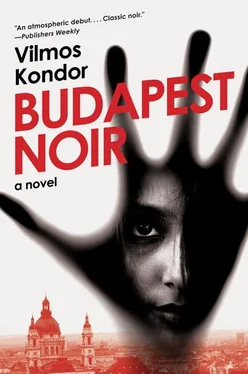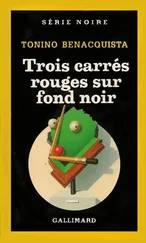Time stopped. Even from afar, Gordon could hear the cracking of bones. Pojva’s head snapped back, his eyes rolled upward, and his arms flopped down lifelessly to his sides. He collapsed like an empty sack of potatoes. For a moment the crowd fell silent and then, all at once, began to roar. Jacek was still standing in the middle of the ring. The referee pushed him into the corner, stepped over to the body lying on the floor, and, kneeling down, put his hand around Pojva’s wrist.
By now a good number of onlookers had hurried toward the steps leading out of the cellar. The referee held Pojva’s wrist in his hand for a while, and then he shook his head. He stood, went over to Jacek, and raised his hand in the air. But the crowd was already surging up into the courtyard. The referee whispered something to Jacek, who nodded, quickly lifted the rope, and headed toward the iron door.
Gordon did not leave. His right hand hung limp by his side; his left raised a cigarette to his mouth. The iron door opened again, and two men emerged, one of them pushing a wheelbarrow. The cellar had emptied out with surprising speed, and by now even the referees had fled. Gordon watched from the shadows as one of the men jumped up into the ring and kicked Pojva’s body to the ground. His partner grabbed the corpse under the arms and pulled the upper body onto the wheelbarrow. The other man now took the legs, flung them up as well, and then they hurried off toward the door.
Gordon went up the stairs to the courtyard. The more daring bookies and their clients were still there hastily arranging their affairs. Gordon followed the dark hallway back out to the factory grounds. A horse-drawn carriage stood at one of the delivery ramps, half filled with firewood. The door leading to the ramp now opened, and out walked the two men he’d seen in the cellar. They were pulling a sack, which they now picked up and flung on the back of the carriage. One of the men jumped in after the sack and in no time covered it with firewood. The other got in the driver’s seat and cracked the whip, whereupon the caretaker, who had already left his booth, opened the gate. Gordon stepped out the side entrance onto Gubacsi Road and watched the carriage fade into the night.
Eleven
Gordon walked over to Soroksári Road and stood at the tram stop. When the tram arrived, he flung away his cigarette butt and got on. The city turned increasingly colorful and bright the closer they got to downtown. Fewer and fewer people on the streets were making their way home from work, and ever more were looking for evening entertainment. Illuminated boats swayed out on the Danube, and on this crisp autumn night every single window of the fortress up on Castle Hill was clear as day. Calvin Square was teeming with cars, and the traffic was heavy in front of the hotels. Restaurant windows revealed packed tables and, occasionally, the glint of a Gypsy band leader playing his violin. The National Museum sprawled out in all its stateliness from behind the tall trees on its grounds. Neon lights flashed on Apponyi Square, marked by the quiet chaos of buses, trams, and horse-drawn carriages.
An enormous clock in the display of a jewelry shop showed the exact time: seven-twenty. Gordon headed toward the newsroom.
Only a couple of people were still in the office. Gordon greeted Valéria, hung his jacket on the coatrack, and headed to his desk. But Valéria now looked up from her novel and called after him in a raspy voice.
“There was a telephone message for you.”
“You’re kidding,” said Gordon, turning around.
“It was Krisztina. She wants you to call her, something about her asking whether . . .” Valéria leaned closer to the sheet of paper, for she couldn’t even read her own handwriting. “. . . to reserve a table.”
“I understand.”
“Or if the preserve is edible . . .” she added, then went back to reading.
Gordon pulled out his chair, switched on his green glass banker’s lamp, and sat down. For a while he just stared at the typewriter, but then he pulled his notebook from his pocket and turned the pages. He rolled a sheet of paper into the typewriter, drew the machine in front of him, and slowly began to type. Not that he’d learned anything new from Gellért about Róna, but Gyula Turcsányi was already eagerly awaiting the article. Gordon got down to writing what little he knew until an apprentice reporter walked up to him: a thin, pimply boy barely twenty years old and wearing a blazer one size too big.
“What do you want, son?” said Gordon, raising his eyes.
“If you don’t mind, sir,” the boy anxiously replied, extending a typed page toward Gordon, “could you look over this article? The deadline is tomorrow.”
“What is this?”
“An article. I . . . I wrote it,” he stammered. “No one else was in to write it. Mr. Turcsányi said you were out sick.”
“And?”
“He also said you’d be in tomorrow and that I should show you then.”
“Fine, then. Show me tomorrow.”
“I’d really appreciate it if you’d look at it now,” said the boy, his face flushed. “I’ve never written an article like this.”
“And what is it about?”
“A suicide.”
“How many suicides does that make for the week?”
“I don’t know, Mr. Editor,” replied the boy.
“Let’s see it.”
Gordon put the sheet of paper in front of him and reached for his red pencil. The pain had by now subsided sufficiently in his hand. Gordon read, underlined, crossed out, and corrected.
“Please, sir, don’t cross out the word suspicious ,” said the boy.
“Why not? A suicide can’t be suspicious.”
“Sure it can,” the boy protested. “I called police headquarters a little while ago, and one of the detectives said the man died under suspicious circumstances.”
“Who did you talk to?”
“Chief Inspector Szrubián.”
“Well then, you just go on over to the telephone and call Chief Inspector Vladimir Gellért, who is also a section head. Tell him I told you to call. Maybe he’s still in.”
The boy nodded. Gordon took out his cigarette case and lit a smoke. A couple of minutes later the boy returned.
“Chief Inspector Gellért said it’s not suspicious.”
“You see,” said Gordon with a nod. “So then, the title of this article should really be: ‘Wealthy Merchant’s Unexpected Suicide.’ It would be suspicious if the detectives suspected that someone had killed him.” He looked down at the article, then back up. “A stranger. Or his wife. But that’s not what happened, is it?”
“No,” replied the boy with a frightened look. “Chief Inspector Gellért said everything about this case is perfectly clear, and that it was a suicide.”
“The rest is fine,” said Gordon, taking a drag on his cigarette. “Just be careful with what comes first in the lead. That’s very important. You wrote, ‘This afternoon in his home on Pasaréti Street, using a revolver, the owner of the Arabia Coffee Company took his own life.’ The important thing is neither when nor where. But who. Thus: ‘The owner of the Arabia Coffee Company took his own life with a revolver this afternoon in his home on Pasaréti Street.’ And who he left his estate to, that doesn’t belong in the lead, either. It’s enough if you mention the maternity home only farther down. So then, go on back now and retype the article.”
The boy took the sheet of paper and headed back to his desk.
“Son,” Gordon called after him.
“Yes, sir?”
“There’s one thing you shouldn’t forget. Your job is to write what happened. Leave out the speculation. It’s not your job to go guessing about the why .”
The boy sat down at his desk and began rewriting the article. Gordon typed the final keystroke of his own article and pulled the sheet of paper from the machine. Pulling on his jacket, he placed the article on Turcsányi’s desk. Then he went to Valéria’s desk, picked up the telephone, and, with a less than certain grip, started to dial with his right hand.
Читать дальше
Конец ознакомительного отрывка
Купить книгу












